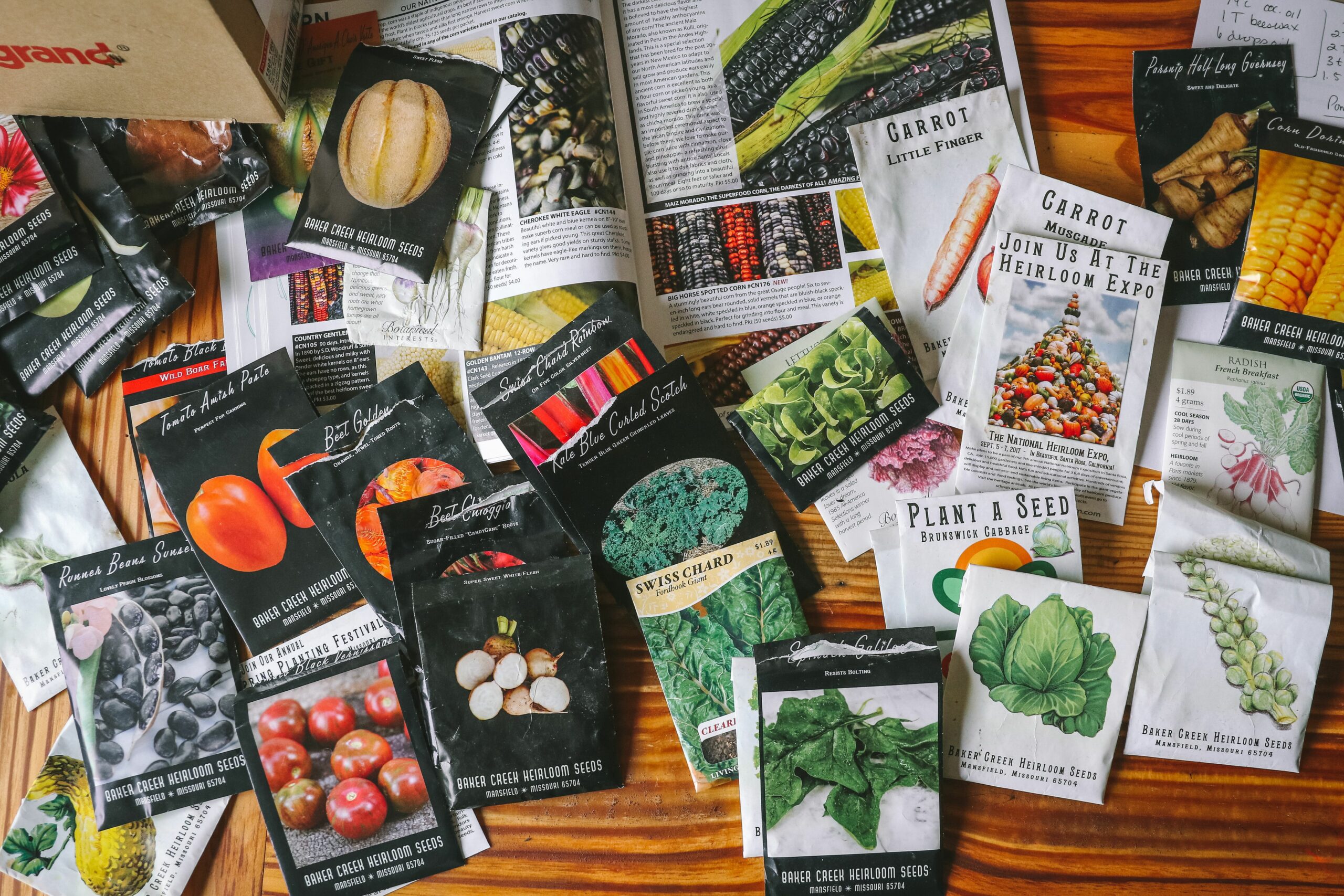
There are mountain-high piles of snow everywhere, freezing temperatures, and spring is nowhere in sight. What is a cold-climate gardener to do?
This is the time to start garden planning and seed buying. During these cold winter months, I like to sit down with my seed stash, take inventory of what I already have, and start planning for the coming spring. You see, good garden planning starts months before your seeds will actually be going into the ground.
Confession time here: I wasn’t always good at planning ahead for the garden. Honestly, even now, there are moments where I get a bit behind in my seed starting or planting out the garden. Because, well, LIFE happens, and life seems be full of cycles of moments where things work out smoothly and other times where things get a bit more chaotic than I’d like (read more here on how I do NOT do it all).
However, I have found that my gardening schedule is a bit more on-track than in the past due to my Old-Fashioned on Purpose Planner. I specifically made sure to add garden trackers in my planner, so it has back pages specifically designed for planning a garden and has a pretty great seed stash inventory sheet to help keep you (and me) organized. Not to mention other great pages to help you organize your life and homestead.
Want to join me in getting a seed inventory ready and also organizing your current seed stash? Watch my video here and grab your planner (or sheets of normal paper) and get cracking on your seed inventory while watching.
Now that we’ve organized our old seeds, let’s move on to another important topic: what type of seeds you should purchase.
One question that I get often from y’all is “what type of seeds do you use?” Like all other aspects of our old-fashioned way of life, my seed choice follows suit. I grow heirloom seeds for so many different reasons and I thought I would share why I grow heirloom seeds in this article.
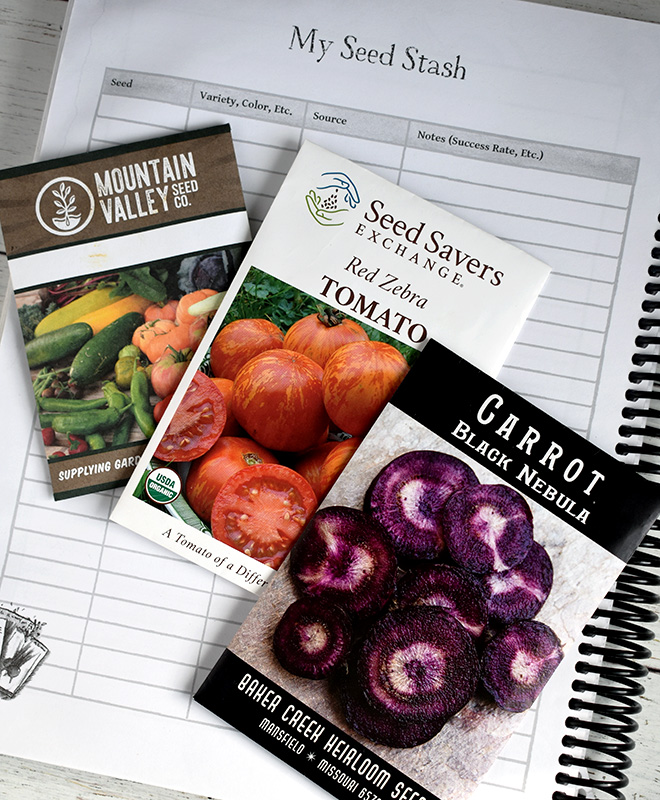
What Makes a Seed an Heirloom?
Seeds are just seeds, right? If only this were true, but in this day and age, there is no such thing as just a seed.
You have your GMOs (Genetically Modified) which are seeds that have been altered in labs for specific traits, like herbicide resistance. GMOs are usually used by large-scale commercial farming operations, not home gardening.
Then you have your hybrid seeds; these are usually cross-pollinated by humans to combine specific traits. Hybrid seeds do not produce true-to-type vegetables every year, so you will need to purchase seeds for every planting season.
Finally, you have your heirloom seeds; these seeds are not altered in a lab or cross-pollinated to get specific results. So, what makes a seed an heirloom seed?

Heirloom seeds are:
- Open-Pollinated – which means that they are pollinated by birds, the wind, or other natural means. This also means that seeds planted from an heirloom vegetable will produce other true-to-type vegetables.
Note: True-to-type is when two plants from the same species are pollinated and the saved seeds from those vegetables produce the same traits as the parent plants. - Passed Down from Generation to Generation – Heirloom seeds are seeds that have been saved and produced true-to-type vegetables for 50 years or more. It is amazing when you stop and think about how many people had to grow heirloom seeds for them to be planted in your home garden.
Reasons You Should Grow Heirloom Seeds
There really are so many great reasons why you should. Here are a few reasons why I personally grow heirloom seeds in my garden:
Reason #1: Each Seed has a History
Great-Great Grandmothers, 18th Century Farmers, and local gardeners have worked hard saving these seeds over generations. Each seed has an origin and a history of how it came to be. It truly is an amazing realization that with one seed planted you have become a small part of that story.
I love reading heirloom garden catalogs and reading the fascinating stories about how some heirloom seeds have been preserved for years and years, for example, how some heirloom seeds have been saved from near-extinction just because so-and-so’s grandparent saved some seeds. Those garden catalog stories always make me smile. It makes those heirloom seeds extra special when you know the history and stories that they come with.
Reason #2: Grow Heirloom Seeds for Variety
There are so many different colors, sizes, and varieties of heirloom seeds to choose from. They are not the blah, uniform commercial hybrids you find at the grocery store.
Heirloom tomatoes are a great example of the wide variety. Take a look, for example, at different seed catalogs to compare the vibrant colors, random shapes, and different sizes of the many varieties of heirloom tomatoes available.
And it’s not just heirloom tomatoes that come in tons of varieties. There are SO many other heirloom garden vegetables (and even flowers) that come in an abundance of sizes and colors. It’s kinda fun to try growing different types of these beautiful heirloom plants in various “extra” spots in the garden (some heirloom veggies are a MUST in my garden every year, and trying new heirlooms is fun, but only in my spare garden spots…).
Reason #3: Heirlooms Have the Best Taste
Unlike hybrid seeds, heirloom seeds have not been modified or tampered. The resulting heirloom vegetables, fruits, or herbs have been left with their own unique and delicious flavors. I have found that with a lot of the store-bought produce that I don’t care for, it was entirely different when an heirloom variety of that same produce was tried.
So give those boring, not so tasty, store-bought veggies a second chance in your garden; but just find the right heirloom variety to grow instead. You might be surprised at the complex depths of flavors that you can get from those heirloom plants.
Reason #4: Grow Heirloom Seeds for Great Nutrients
Larger yields, shipping capacity, shelf life, and perfect uniformity have taken priority over nutritional value when it comes to grocery store vegetables.
According to some studies done, there are some “diluting effects” that take place when industrial growers focus on larger quantities and cost. These effects are causing the decline in nutrients in the produce found in most grocery stores.
When heirloom seeds are grown with the right methods and in the right environment, the result is more nutritious produce for feeding your family.
Note: Not all heirlooms will contain more nutrients than your standard grocery store produce. You will need to some in-depth research on specific heirloom varieties to learn about their nutritional value and potential advantages.
Reason #5: Grow Heirloom Seeds to Save Seeds
As I mentioned before, heirloom seeds produce true-to-type vegetables. This means that you can save the seeds, and plant them the following year and still get the same great vegetables. If your seed saving is done correctly, you won’t need to buy seeds until you want to try something new.
The idea of saving seeds goes hand-in-hand with the homesteading way of being more sustainable. If seed saving is something of interest for you, you should plan for extra vegetables to use. In order to save seeds, some of your vegetables will need to be left in the garden to mature.
You can read a bit more about seed saving and all it entails in How To Plan Out Your Fall Garden. I also love using the book The Complete Guide to Saving Seeds by Robert E. Gough and Cheryl Moore-Gough to learn the specifics on seed saving for each type of plant.
Reason #6: Heirloom Seeds are Less Expensive
Overall, heirloom seeds are less expensive. There is no fancy cross-pollination or expensive lab modifications. If you take a look at the seeds on the store seed rack, you will notice that the price reflects that. Not to mention the ability to save your seeds, saving you money in the long run.
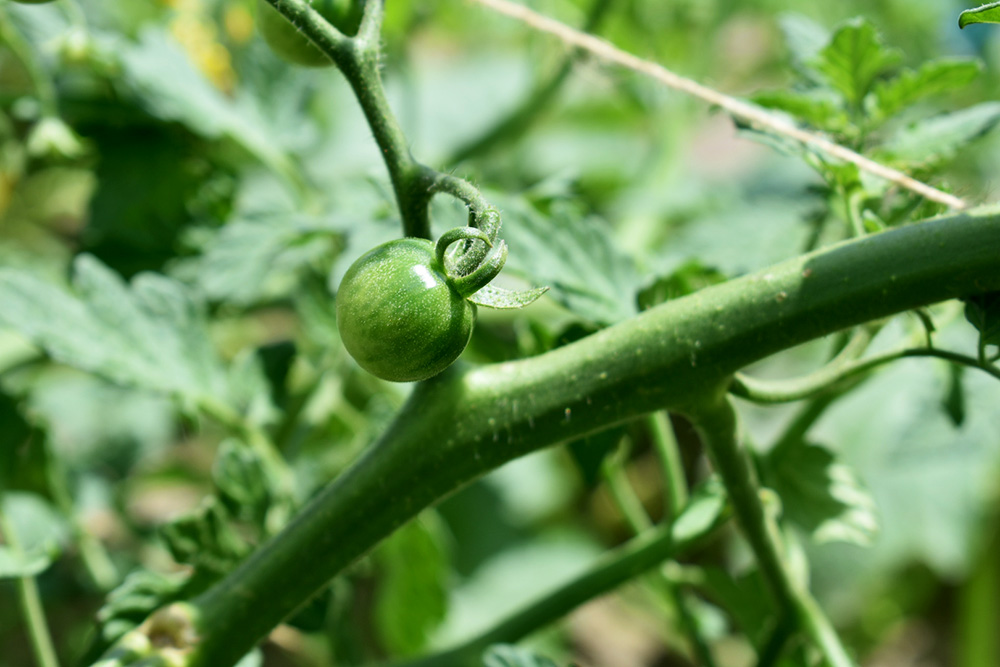
Common Heirloom Vegetable Types
Heirloom does not mean that the vegetable choices are odd or something different that you have never heard of (unless that is what you are looking for). You will still find your common home garden seeds, there just may be more variety to choose from.
My current favorite place to buy heirloom seeds is True Leaf Market. You can also check out my article Where to Buy Heirloom Seeds for more options for finding good-quality heirloom seed companies.
Easy to Grow Heirlooms:
- Carrots – Ex: Danvers and Scarlet Nantes
- Cucumber – Ex: Ashley and Boston Pickling
- Tomatoes – Ex: Amish Paste and Black Krim
- Green Beans – Ex: Provider and Kentucky Wonder
- Peas – Ex: Champion of England
- Zucchini – Ex: Black Beauty
- Winter Squash – Ex: Waltham Butternut Squash
- Radishes – Ex: French Breakfast Radish
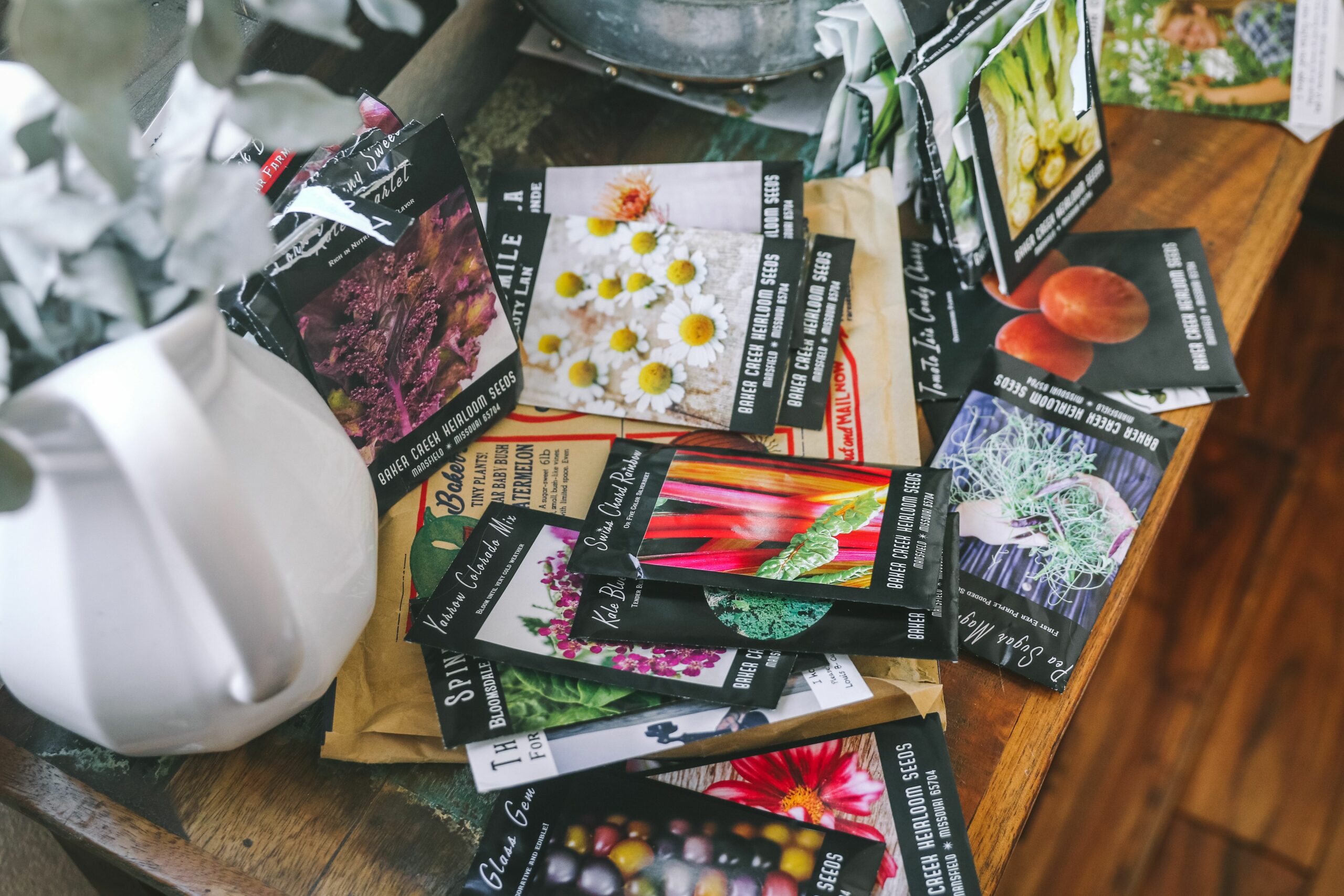
Are Heirloom Seeds Harder to Grow?
There really isn’t a huge difference between growing heirloom seeds and standard seeds.
When you are planting any seeds in your garden, it is important to read the description, and pay close attention specifically to the growing conditions and number of days until harvest. Seeds that are planted in the wrong conditions will be harder to grow no matter what type they are.
Remember, heirloom seeds have not been altered to be disease resistant or cross-pollinated for different growing traits. When you decide to grow heirloom seeds, you are getting seeds that need some care and maintenance.
For a little extra growing help, you can read these gardening posts:
- Simple DIY Seed Starting System
- Seed Starting Guide
- 3 Things Need to Know Before You Start Your Garden
- The Best Organic Fertilizers for Your Vegetable Garden
- DIY Organic Aphid Spray Recipe for the Garden
- Fast Growing Vegetables to Grow for an Early Harvest
Buying Heirloom Seeds for Your Garden
During these past few recent years, there has been a noticeable increase in the number of people that are interested in gardening. It is great that people are starting to think about their food sources and taking steps to provide their own produce.
There are a few things to think about when you are seed buying online or in person.
Tip #1: Buy Your Seeds Early
The increase in folks interested in gardening means that seeds are a high-demand item at the moment. Due to this high demand, I have been ordering my seeds earlier than I have in previous years. If you have an idea of what you will plant in the spring, I recommend buying your seeds in December rather than waiting.
Tip #2: Buy Heirloom Seeds From Known Sources
When you are buying heirloom seeds, you should buy from a reliable local source or look online at the many different heirloom seed companies. Personally, I buy most of my heirloom seeds now from True Leaf Market; they always seem to have just what I need, and they have a great collection of seeds for everyone to find something they love.
If you are interested in learning more about heirloom seeds and where to buy them take a look at this post Where to Buy Heirloom Seeds.
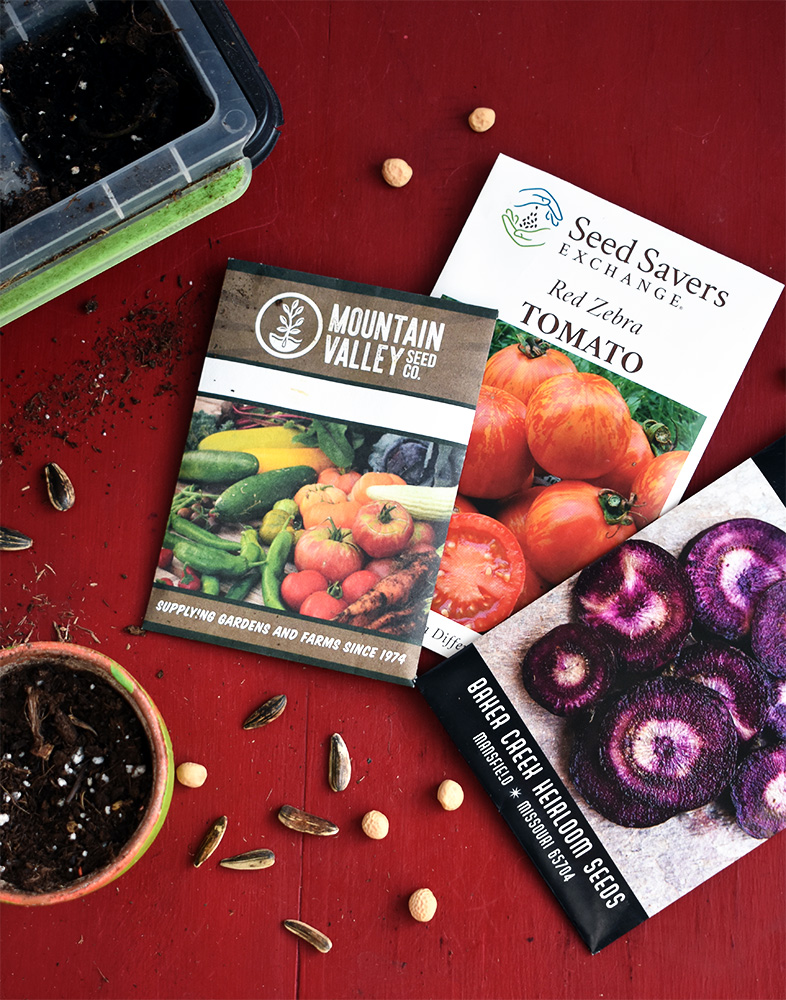
Are Heirloom Seeds Right for Your Garden?
There are some pretty great reasons to consider planting heirloom seeds in your garden. Don’t settle for the uniformity of grocery store produce when you can grow your own more nutritious, tasty fun varieties. Heirloom seeds are a true-to-type vegetables that allows you to save seeds and that adds one more way you have freed yourself from the standard system to your list.
More About Gardening:
- Reasons to Plant a Victory Garden
- How to Manage Your Garden Harvest (Without Losing Your Mind)
- Vegetables that Grow in the Shade
- How to Grow Your Best Onion Crop Ever
- How to Plant Garlic
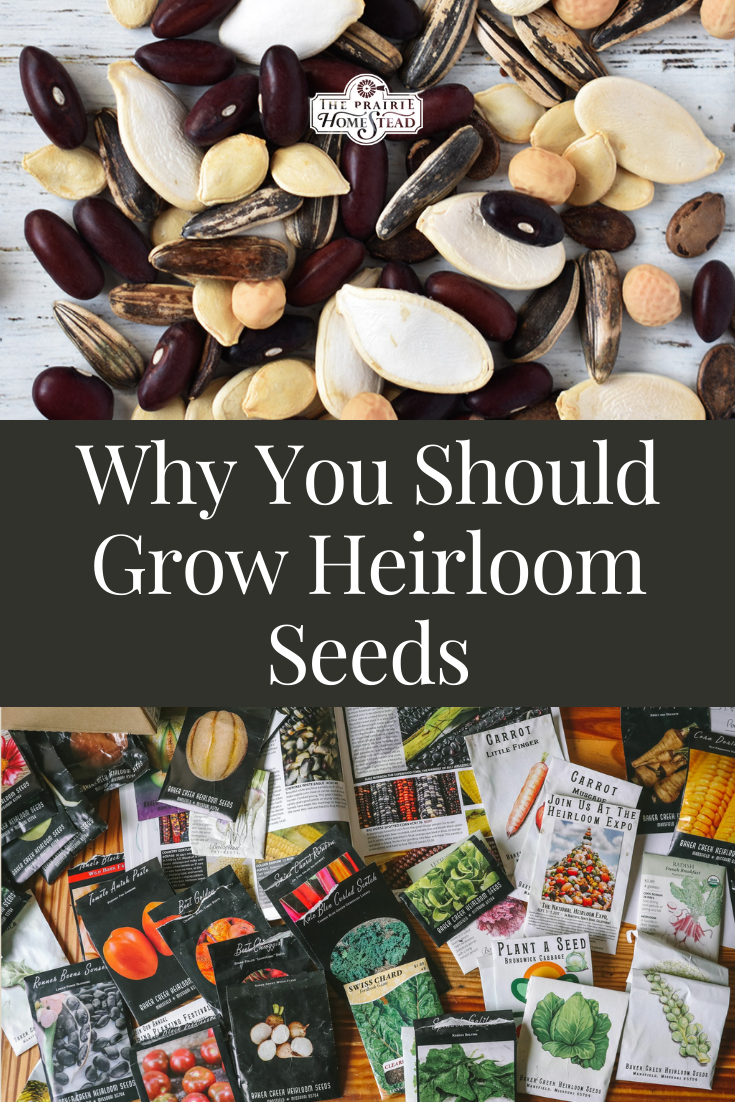
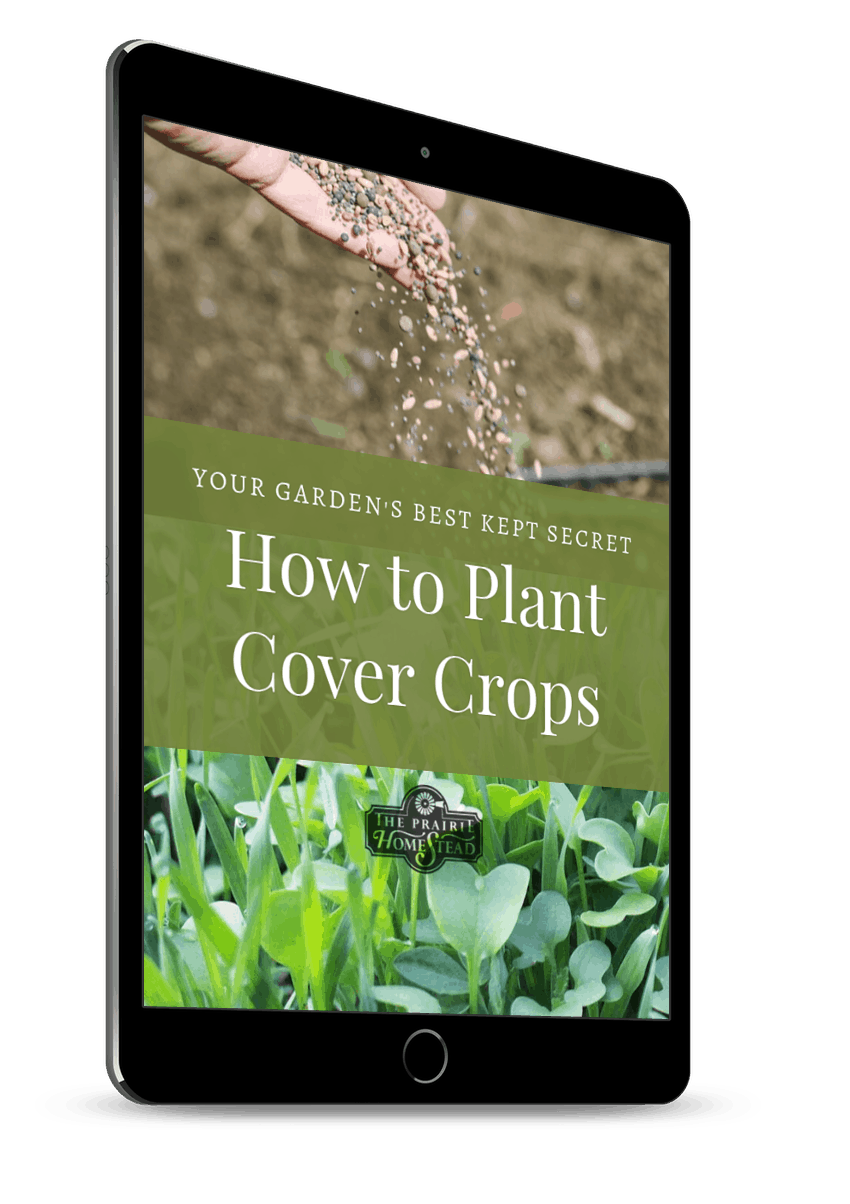
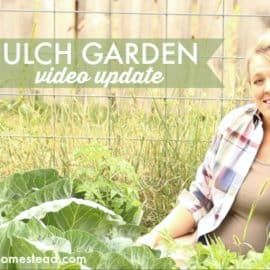
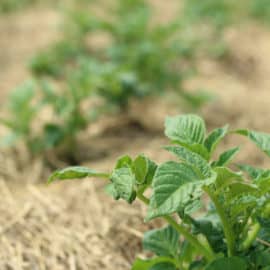
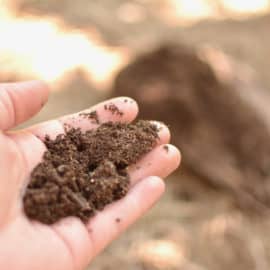
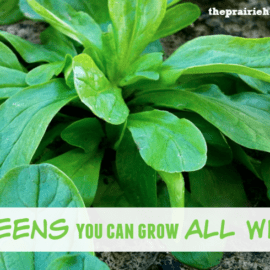
This is a great post. I’ve been using heirloom seeds for a few years now and when asked why, I often reply, “I don’t know, I just prefer them”. I get a few knowing nods along the way, but usually no other comment. One person did say something about modified or hybrid seed having more disease and pest resistance. Okay… I guess (I kind of like rotation and companion planting for this purpose).
Your post speaks to several topics I’ve been reading about, all related to heirlooms. The historical aspects (e.g. Seed Savers Trail of Tears Beans), flavor, variety, true-to-type, seed saving, and so on. Nowadays, I’m becoming interested in finding the same seed my grandparents used, just for the fun of it. Also seed from local sources with known results in the challenging Colorado climate where I live. My latest topic of study is plant phenology to understand what soil and climate have to do with which varieties do best.
And most of all, you’ve re-inspired me to pursue heirlooms more than ever. Thanks!
Do you have a coupon code for True Leaf Market?
Hi Hannah. Yes, we do have a code–for a limited time–take $10 off a $50 order with code JILL. Glad you asked! –Michelle/Marketing & Project Manager for The Prairie Homestead
I like Heirloom Mountain, they have great seeds and are a small co.
Have you thought about organizing your seeds catalogue-style, and then storing them in mylar bags? Inexpensive, and effective when it comes to keeping things like seeds for longer periods of time.
I share your concern for Genetically Modified stuff. Lately I have heard of a new way that plant and animal breeders modify the genetics of products, using a new technology called CRISPR. It is fast and cheap, but has dangerous effects that can not be recognized in the first or second generation of the modified product. I’d like to read what you have to say about this if possible.
We love our heirloom seeds too!